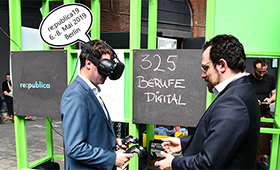Who will save work?
BIBB is presenting innovations in vocational education and training at the “re:publica” Conference in Berlin from 6 to 8 May
15/2019 | Bonn, 30.04.2019

The ongoing digitalisation of the economy and of society as well as the increased deployment of computers, robots, and artificial intelligence will radically change work. What sort of work will we perform in future? How many skilled workers will be required? And what competencies and qualifications will employees need order to overcome future challenges?
The Federal Institute for Vocational Education and Training (BIBB) will be providing answers to questions like these at the “re:publica” Conference to be held in Berlin from 6 to 8 May (stand number 3b02).
In its capacity as a centre of excellence for initial and continuing vocational education and training in Germany, BIBB will use the conference to explain how the process-oriented and systemic thinking, media and IT competence and sustainability and communication skills that will be required in future have already been incorporated into the 325 state-recognised dual training occupations in order to prepare the trainees of today for the skilled tasks of tomorrow.
On 8 May at 11.45 a.m., BIBB’s Director of Research Professor Hubert Ertl will use a so-called “Lightning Box” format supported by videos and expert discussions to illustrate the qualitative and quantitative changes which increasing digitalisation of the world of work will entail.
Professor Ertl believes that these changes will result in far-reaching challenges for initial and continuing vocational education and training. “The requirements associated with digitalisation are dynamising learning and teaching processes in all areas of VET. New pedagogical concepts need to be developed and implemented in conjunction with vocational education and training research and practice.”
Alongside the “Lightning Box” on the topic of digitalisation, the German Office for International Cooperation in Vocational Education and Training (GOVET), which is funded by the Federal Ministry of Education and Research (BMBF), will also be providing information on Germany’s multifarious involvement in international VET cooperation. In an age of global and digital production and supply chains, vocational education and training needs to be considered in an even more international light than before. A session to be held on 7 May at 1.00 p.m. (“Education and Science Diplomacy”) will look at the aspect that vocational education and training cooperation also makes a major contribution to the diplomatic endeavours undertaken by Germany.
Under the title of “skills4future:needs”, BIBB and GOVET will use projects, exhibits and expert discussions to present a broad spectrum of further examples of successful innovative VET in practice. These presentations will take place both at the stand and as part of the supporting programme. The topics addressed will include the following.
- The new training occupation of “management assistant in e-commerce”
- Innovations in nursing and healthcare professions and in the textile industry
- The use of drones in agriculture, horticulture, surveying and the restoration of buildings
- Virtual and augmented reality (VR + AR) in vocational education and training
- Sustainability in food and service occupations
- Freely available knowledge via Open Educational Resources and citizen participation in the collection of research data via Citizen Science
The “re:publica” Conference has been staged annually in Berlin since 2007. It focuses on how society deals with the Internet and digitalisation and has won considerable acclaim both nationally and internationally. According to the organisers, “re:publica 2018” was attended by around 20,000 people from 82 countries. Around 1,000 presentations and 500 programme sessions enabled these visitors to gain information and become actively involved.
Points of contact:
BIBB: Andreas Pieper, pieper@bibb.de, Tel.: 0228 / 107-2801
GOVET: Thorsten Schlich, schlich@govet.international, Tel.: 0228 / 107-2835
Specimen copy requested if printed.